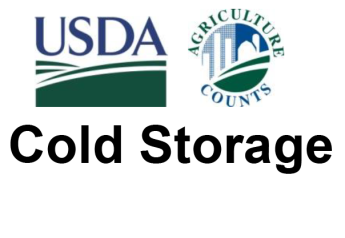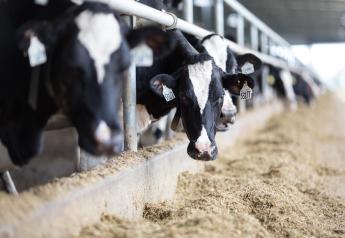Strike at Canada’s Busiest Ports Causing Severe Disruption to Nation's Economy

OSU economist urges major change for CRP via farm bill
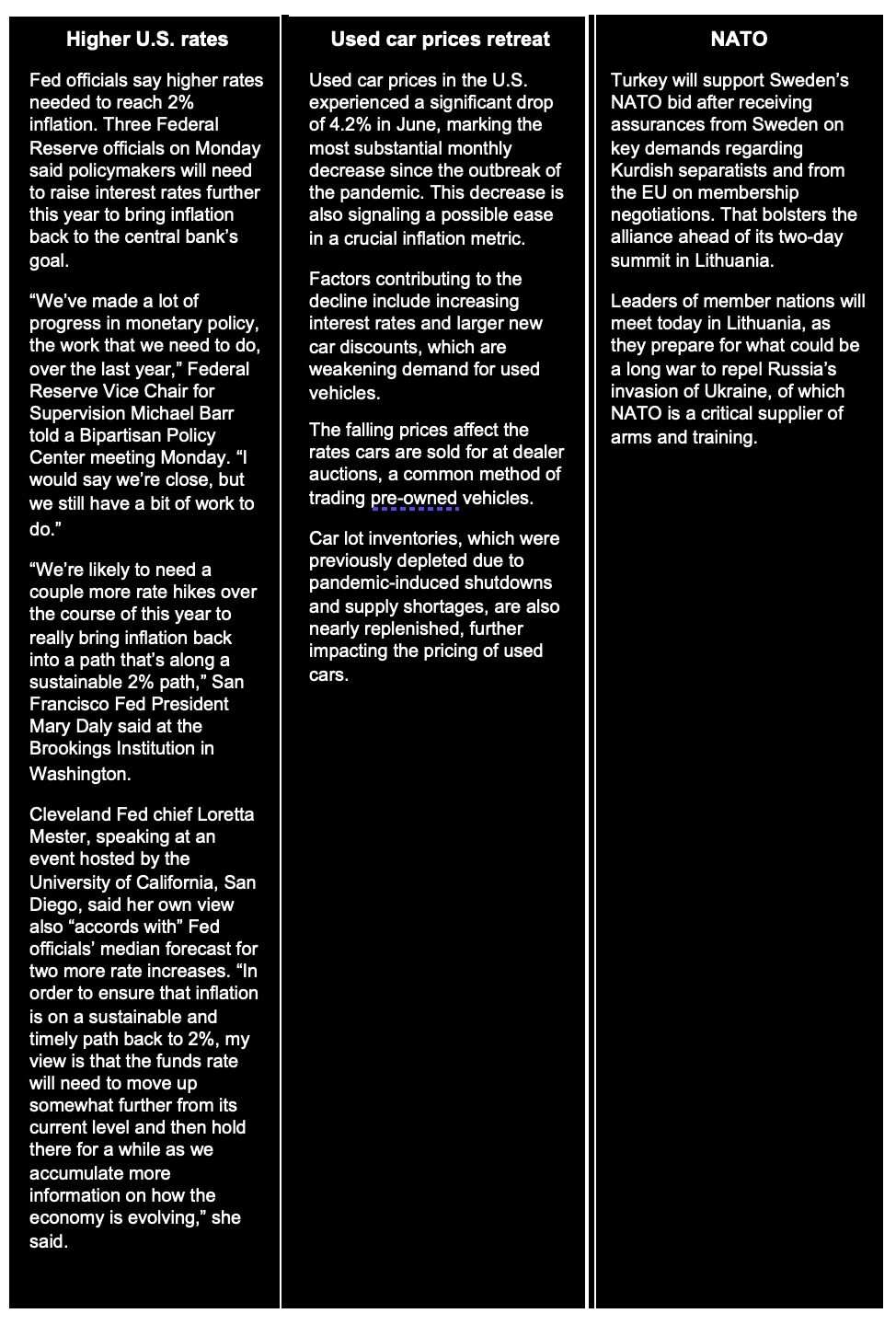
|
In Today’s Digital Newspaper |
Turkey agreed to support Sweden’s NATO bid in a breakthrough for the military alliance’s push to strengthen its defenses following Russia’s invasion of Ukraine. Meanwhile, Ukrainian President Volodymyr Zelenskyy scolded NATO for not setting a clear timeline on his country’s bid to join the military alliance, even as its chief, Jens Stoltenberg said he will push for a fast-track process for Kyiv.
Chinese officials are signaling extra targeted stimulus could be on the way, and an ex-central banker says they can do more. Top state-run financial newspapers ran reports Tuesday flagging the likely adoption of more property supportive policies, along with measures to boost business confidence. More in China section.
U.K. wages rose more than expected, and a key lending rate for mortgage holders has surged to its highest in almost 15 years. More in Markets section.
Americans are facing tighter budgets as student loan payments resume. Details below.
Russia bombed one of the export facilities in Odesa overnight. The total damage is not known. More in Russia & Ukraine section.
According to a farm policy expert, the upcoming farm bill presents an exceptional chance for Congress to revamp the Conservation Reserve Program (CRP). This federal program, initiated in 1985, pays farmers to set aside portions of their fragile farmland from crop production for 10-15 years in a bid to conserve the land. However, participation in this initiative has drastically decreased since 2007. Critics believe the program has strayed far from its original intent. The suggestion now is to reorient the program to prioritize smaller land tracts that require focus and to promote carbon sequestration on grasslands. Economists like Dr. Carl Zulauf from Ohio State University believe it is essential to reform the system, which also provides farmers with cost assistance payments for implementing specific conservation practices. More details in Policy section.
Record crops in Brazil are prompting a Vale-backed rail company to expand its fertilizer business with a new terminal connecting producing regions to the country’s biggest port.
Mountain Valley Pipeline Construction blocked by Fourth Circuit. Water crossing permits issued for the Mountain Valley Pipeline have been put on holding pending an appeal by environmental groups that argue the project puts protected species at risk, according to a ruling issued Monday by the Fourth Circuit. More in Energy section.
Nutrien, a significant potash producer, has disclosed a reduction in output from its Cory potash mine due to an ongoing strike by the International Longshore and Warehouse Union (ILWU) in Canada. The strike at Canada’s busiest ports, including the Port of Vancouver and Port of Prince Rupert, is causing severe disruption to the nation's economy and shows no signs of a quick resolution. Details in Markets section.
Rice prices in Asia have surged to the highest in more than two years as importers build up stockpiles on fears that the onset of El Niño will parch plantations and damage crops. More below.
Update on 2022 ERP: A USDA official told us: “It certainly helps us get to the end goal but there are other policies that are area based that need to be finalized prior to 2022 ERP going live; not to mention that we still will be required to publish a NOFA announcing 2022 provisions in the Federal Register before sign up is announced.”
The American Carbon Alliance (ACA) was launched in Urbandale, Iowa, with the aim of harnessing the potential of carbon capture technology to strengthen the rural communities and America's agricultural economy. More in Policy section.
Monday evening, the U.S. Senate voted in favor of cloture concerning the nomination of Xochitl Torres Small for the position of deputy USDA secretary/ The final vote to confirm Torres Small in her new role is anticipated to occur today. More under Personnel section.
John Kerry, President Biden’s climate envoy, will travel to China this week to resume talks on global warming. Details in China section.
China's state-run media indicated the potential for additional policies aimed at bolstering the real estate segment, signaling a response to the intensifying stress in the country's $12 trillion onshore credit market. More in China section.
Australia and the European Union’s negotiations to conclude a free-trade agreement are at an impasse over Canberra’s concerns that the bloc is offering insufficient access to the nation’s agricultural exports.
The Mountain Valley Pipeline project, located in Virginia's Jefferson National Forest, has been temporarily halted by the Fourth Circuit, pending review of an environmental group's petition against the Bureau of Land Management's approval of the contentious energy infrastructure project. More in Energy section.
Tax and law firms are expanding their teams to manage the burgeoning demand for clean energy, driven by corporate clients eager to take advantage of the Inflation Reduction Act (Climate Bill). Details in Energy & Climate Change section.
The International Agency for Research on Cancer (IARC) announced plans to release its assessment regarding possible carcinogenic effects of aspartame, a commonly used artificial sweetener, this Friday.
|
MARKET FOCUS |
Equities today: Asian and European stock markets were mixed to firmer in overnight trading. U.S. Dow opened around 140 points higher. Wednesday brings the closely watched consumer price index reading for June, while data about wholesale inflation comes out Thursday. Most international markets rallied overnight thanks to news of more Chinese government support for the property sector and steady EU inflation data. In Asia, Japan flat. Hong Kong +1%. China +0.6%. India +0.4%. In Europe, at midday, London -0.1%. Paris +1%. Frankfurt +0.4%.
U.S. equities yesterday: The Dow ended with a gain of 209.52 points, 0.62%, at 33,944.40. The Nasdaq rose 24.77 points, 0.18%, at 13,685.48. The S&P 500 was up 10.58 points, 0.24%, at 4,409.53.
The Securities and Exchange Commission (SEC) is set to vote Wednesday on the implementation of new rules designed to fortify money market funds and increase their resilience in critical times, such as during financial crises. These rules were triggered by instances of funds running liquid cash shortages during crises like the 2008 financial meltdown and the Covid-19 pandemic.
One of the proposals that has encountered resistance from the almost $6 trillion industry involves the introduction of "swing pricing" adjustments. This measure aims to distribute trading costs to the investors involved in the transaction, which could deter a rush to cash out during panicked moments, as observed during March 2020, due to the Covid-19 pandemic. However, if implemented, it would apply only to selected institutional and tax-exempt money-market funds, which manage around $300 billion collectively.
Additionally, the SEC proposed increasing the minimum liquidity requirements for daily and weekly liquid assets to 25% and 50%, respectively. This change is anticipated to provide more robust buffers against sudden large-scale redemptions. These proposed rules were first introduced in December 2021, and the SEC is now voting on them post a period of public comments. The final rules are expected to deviate from the originally proposed versions.
Agriculture markets yesterday:
- Corn: December corn rose a nickel to $4.99 1/2, a mid-range close.
- Soy complex: November soybeans surged 27 3/4 cents to close at $13.45 1/2. August meal futures settles $3 higher at $405.8. August soyoil futures led the complex higher, rising 276 points to 65.33 cents, the highest close since November.
- Wheat: December SRW wheat fell 3 cents at $6.63 1/2 and nearer the session low. December HRW wheat dropped 5 1/4 cents at $8.14 1/4 and nearer the session low. September spring wheat futures rallied 2 1/2 cents to $8.50 1/4.
- Cotton: December cotton fell 192 points to 79.25 cents, ending the session below the 40- and 20-day moving averages.
- Cattle: August live cattle rose 20 cents to $177.20 and near mid-range. August feeder cattle gained 82 1/2 cents to $246.25 and nearer the session high.
- Hogs: August lean hog futures fell 97.5 cents to settle at $94.175, while nearby July futures fell 20 cents to $98.80.
Ag markets today: Corn, soybean and spring wheat futures firmed amid followthrough buying overnight, while the winter wheat markets posted corrective gains. Corn futures traded mostly 5 cents higher, soybeans are 19 to 23 cents higher, winter wheat futures were 13 to 16 cents higher and spring wheat was mostly 17 cents higher. Front-month crude oil futures were modestly firmer, and the U.S. dollar index was more than 200 points lower.
Market quotes of note:
- U.K. wage growth surprise could spell repeat 50bp rate hike. ING Economics in a research note writes: “A few months ago it looked like U.K. wage growth had peaked. Now it is running at its fastest pace yet, and, depending on next week's inflation figures, it could push the Bank of England into another 50bp rate hike in August.”
- European banks' second-quarter earnings look set to be positive, JPMorgan says, adding that it prefers European sector players over their U.S. counterparts. European banks are likely to report an ongoing rosy picture of resilient net interest income, no sign of asset quality issues, limited pressure on costs and potential comments and clarity around second-half 2023 buyback expectations for some banks such as BBVA, Deutsche Bank, Commerzbank, KBC Group and DNB, JPM says. "On the negative side, we see investment-bank revenue weakness with overall poor cost management," JPM analyst Kian Abouhossein writes. In Europe, JPM says it favors UBS, Julius Baer, Intesa Sanpaolo, Banco de Sabadell and AIB Group, but continues to avoid U.K., French and Nordic banks.
- Student loans. “People have not had to prioritize student loan payments for the last three years,” says Sarah Wolfe, a senior economist at Morgan Stanley. Now they’re “going to have to rethink: ‘OK, do I pay my phone bill first, or my credit card bill first, or my student loan bill, or my mortgage?’” The restart of payments — which average about $400 a month — will force many borrowers to make tough choices on how to allocate their spending. Analysts expect to see more households falling behind on credit card and auto loan payments in the final quarter of 2023.
U.K. wage growth remains elevated. Average weekly earnings, including bonuses, in the U.K. increased by 6.9% in the three months leading up to May 2023. This is the most significant wage growth since August 2021. Regular pay saw an increase of 7.3%, consistent with the previous month and marking the highest rate since the pandemic period of April to June 2021. Unexpectedly, the unemployment rate also rose to 4%, the highest it’s been since Q4 2021, exceeding forecasts of 3.8%.
Market impact: The British pound extended gains and touched the $1.29 mark, its strongest level since April 2022, after hotter-than-expected pay growth data added pressure on the Bank of England to keep raising interest rates. Bank of England Governor Andrew Bailey said on Monday that policymakers had to "see the job through" on bringing down the inflation rate, suggesting the continuity of the central bank's aggressive policy tightening campaign.
Highlights of New York Fed President John Williams’ interview with the Financial Times:
- “I don’t have a recession in my forecast. I have pretty slow growth.”
- “The input increase in labor force participation has been an important contributor to improving supply, but I don’t know if we can get a lot more from that.”
- “The situation in the banking sector really has stabilized… That clearly means that from a risk management point of view, some of the downside risks to my mind are less.”
- “We’ve seen goods prices come down and again, that doesn’t necessitate slack in the labor market. It’s a reversal of some of the pandemic-related effects and a relaxation of the supply-chain bottlenecks. It’s a free lunch.”
- “If anyone can explain to me what used car prices are doing and why, I would love to have that knowledge because that has been a big mover up and down of inflation.”
- “One thing people ask is when will we stop [the shrinking of the balance sheet]. I think that’s well off in the future.”
- “Our actions in the spring of 2020 in terms of asset purchases were extraordinary. The speed and the scale at which we did this was just unprecedented. That was not a case of gradualism, that was not a case of caution, it was a case of decisive action.”
Inflation expectations among U.S. consumers are easing. A Federal Reserve Bank of New York survey found that Americans think inflation will subside to 3.8% a year from now, the lowest reading since April 2021.
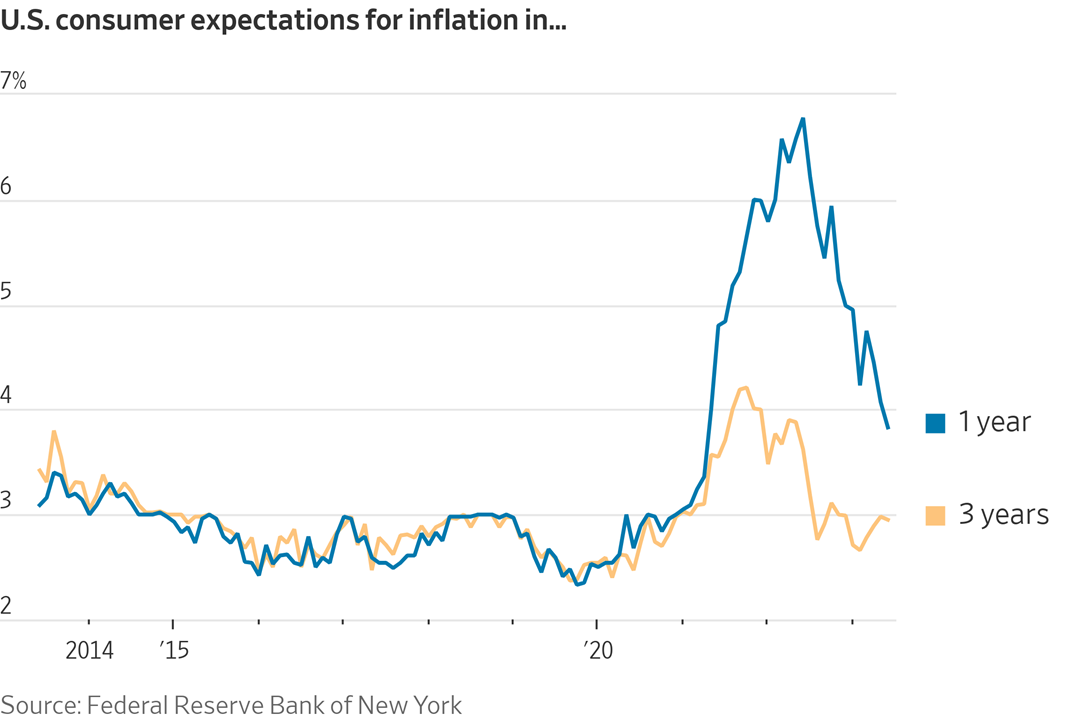
Americans are facing tighter budgets as student loan payments resume.
- Almost 27 million borrowers who have a total of $1.1 trillion in student loans will need to start servicing them again from Oct. 1.
- The restart of payments — which average about $400 a month — will force many to make tough choices on how to allocate spending.
- Wall Street analysts project the restart will further crimp consumer outlays, which are already showing signs of stalling—but not enough to tip the economy into recession.
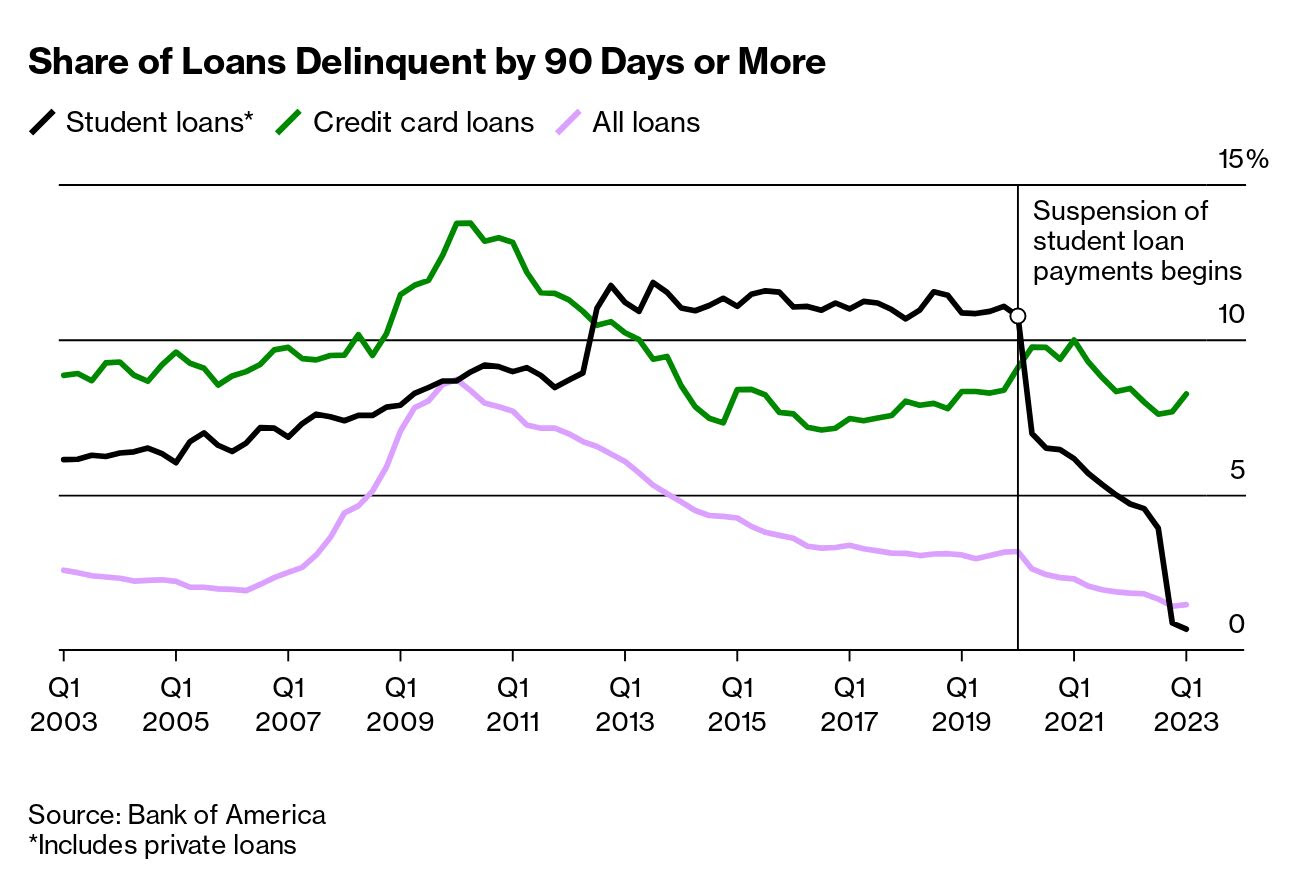
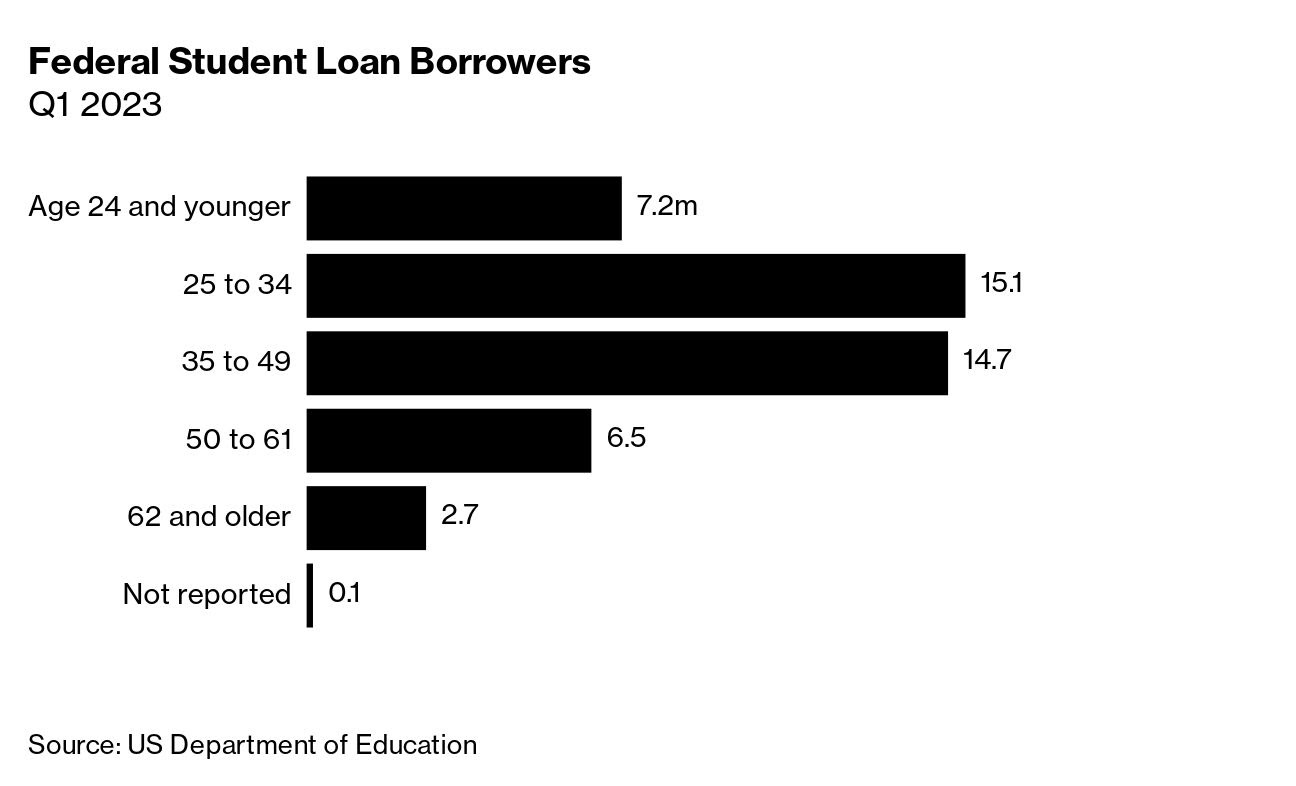
Market perspectives:
• Outside markets: The U.S. dollar index was weaker, despite an overall weaker tone in foreign currencies against the greenback. The yield on the 10-year U.S. Treasury note was lower, trading around 3.97%, with a mostly negative tone in global government bond yields. Crude oil futures have continued to move higher, with U.S. crude around $73.50 per barrel and Brent around $78.20 per barrel. Gold and silver futures rose, with gold around $1,941 per troy ounce and silver around $23.35 per troy ounce.
• The value of the euro has risen above $1.10, marking its most significant growth since May 8. This development comes amid ongoing discussions among investors about the European Central Bank's (ECB) effectiveness in addressing inflation within the Eurozone. Despite statistics showing a slowing of economic growth and a lowering inflation level across the region, investors seem less reassured.
Germany reported an inflation rate of 6.4% in June, a departure from the steadily declining trend since the beginning of 2023. This surge is attributed to a low base effect from the previous year.
Broadly, the Eurozone's inflation rate has dwindled to a 17-month low, registering at 5.5%. Nevertheless, key indicators are still high, with levels above the ECB's 2% target. Current interest rates within the bloc are set at 3.5%.
However, derivative market pricing suggests that traders are expecting these rates to climb significantly, potentially hitting or surpassing 4% by the start of next year.
• Oil prices have marginally moved beyond the $72-77 per barrel range for Brent and $67-72 per barrel for WTI, and there is a growing sense that the market is starting to feel Saudi Arabia’s production cuts and Russia’s export curbs. Hedge fund net positioning in the ICE Brent contract went up by the equivalent of 25 MMbbls last week, the largest week-on-week build in two months, pointing at a potential short-term pricing upside.
• Energy traders in Europe are utilizing artificial intelligence and machine learning technologies to analyze millions of data points daily. This information helps predict how various weather conditions, such as cloud cover in Spain or escalating temperatures in Germany, could influence electricity prices within the European power market. Worth approximately $1.4 trillion, this market has seen a growing trend of automated trading. In fact, automated deals on the major exchange Epex Spot SE in Paris made up 60% of transactions in the previous year, a rise from 55% in 2021. This not only aids in profit-making for trading houses but also impacts the pricing paid by consumers.
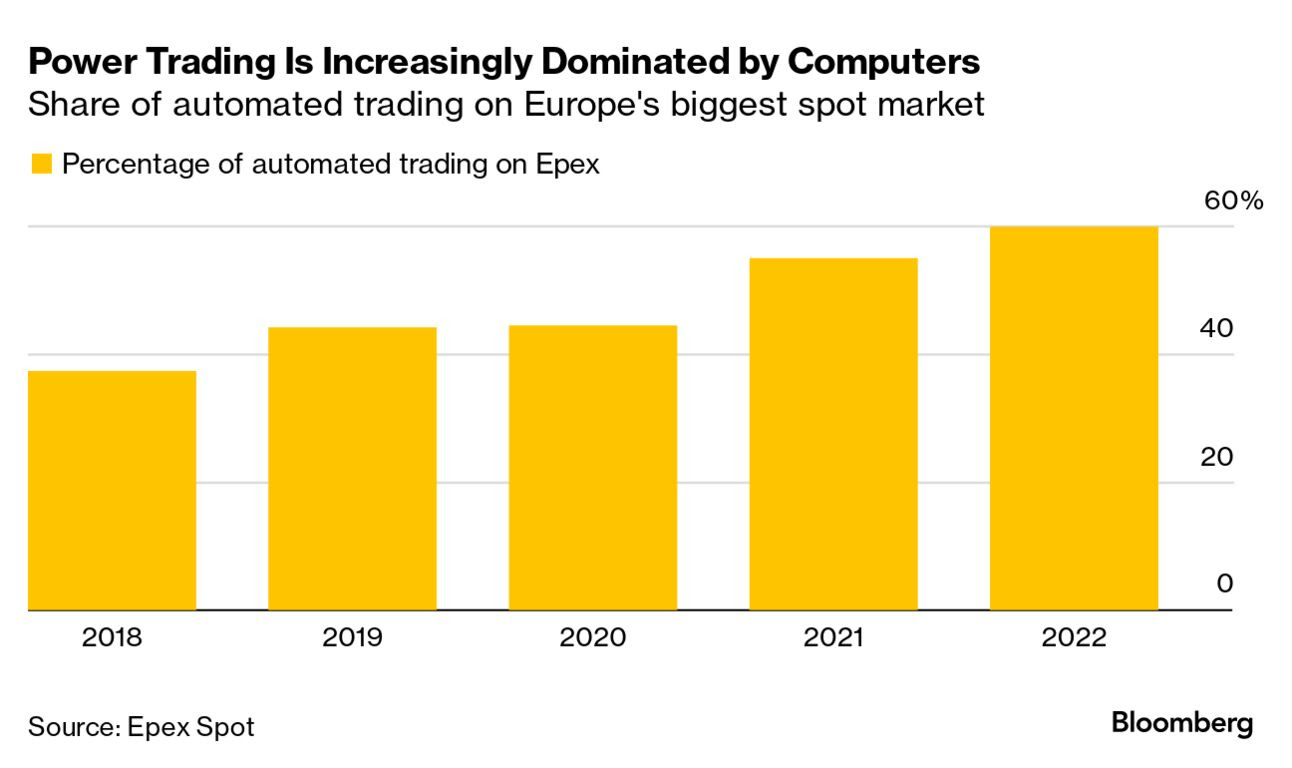
• Berkshire Hathaway Energy agreed to buy Dominion Energy Inc.’s stake in a Maryland liquefied natural gas export project for $3.3 billion. The deal gives Berkshire control of one of just seven operational U.S. facilities.
• Nutrien, a significant potash producer, has disclosed a reduction in output from its Cory potash mine due to an ongoing strike by the International Longshore and Warehouse Union (ILWU) in Canada (see next item for details). The strike, centered at the Port of Vancouver, has caused a loss of export capacity via Canpotex’s Neptune terminal. Nutrien's CEO, Ken Seitz, has warned that persistent disruption may affect operations at their other potash mines within Saskatchewan, and has urged for a speedy resolution to reduce further damages to the Canadian economy. In addition, Nutrien forewarns that the annual results of its potash business will likely fall below prior forecasts due to the strike and other factors. Updated guidance will be provided with the announcement of second-quarter results on Aug. 2.
• The strike at Canada’s busiest ports, including the Port of Vancouver and Port of Prince Rupert, is causing severe disruption to the nation's economy and shows no signs of a quick resolution. The strike has now entered its second week and is causing daily trade disruptions estimated at around C$500 million ($376 million). Implications of the strike have already led to decreased arrivals of container ships, port congestion, and diversions to U.S. facilities. The backlog at the ports, responsible for handling a quarter of Canada’s total traded goods, is hampering both exports and imports.
The British Columbia Maritime Employers Association has calculated a noteworthy figure of C$7.5 billion ($5.32 billion) in compromised cargo due to the strike. Additionally, the Canadian Chamber of Commerce cautioned that this situation could generate inflation. Plunging into its agri-business season, British Columbia has 10 million pounds of blueberry exports, primarily to Japan and South Korea, at stake.
Moreover, this strike threatens a substantial portion of the potash trade, already disturbed by sanctions on Russian and Belarusian supplies. This impact could hit Southern Hemisphere farmers the hardest.
The issue has escalated further with almost 300 vessels now stranded at Vancouver and Prince Rupert ports, causing potential long-term congestion. Analysts suggest that even after the strike is resolved, the congestion will affect inland transportation systems. The situation also could congest U.S. ports, however, attempts to divert shipments via American ports could face resistance as U.S. dockworkers have shown solidarity with their Canadian counterparts.
Amid mounting pressure, stakeholders urge Prime Minister Justin Trudeau's government to intervene. Nevertheless, a resolution similar to the back-to-work legislation used during the 2021 Port of Montreal strike seems improbable due to the government's current coalition with the New Democratic Party, a labor-friendly group. This turmoil adds complexity to the Bank of Canada's impending policy decision, expected to involve an interest rate hike, slated for Wednesday.
• Record crops in Brazil are prompting a Vale-backed rail company to expand its fertilizer business with a new terminal connecting producing regions to the country’s biggest port. VLI, which also counts Brookfield Corp. as a main shareholder, is opening the new facility in Minas Gerais state next month, said Chief Commercial Officer Carolina Hernandez. The terminal has capacity to store up to 1 million metric tons and will haul fertilizers imported at the port of Santos to corn and soybean regions. The added business will help VLI boost utilization of its assets as rail cars that used to travel with idled capacity after unloading crops in Santos will now carry nutrients upcountry. It will also help the company attract new customers, with a similar strategy in the north of the country having already lured fertilizer company Mosaic Co. Link for details via Bloomberg.
• Rice prices in Asia have surged to the highest in more than two years as importers build up stockpiles on fears that the onset of El Niño will parch plantations and damage crops. A benchmark grade in the region, Thai white rice 5% broken, has climbed about 15% in the past four months to $535 a ton, the strongest since early March 2021, according to data from the Thai Rice Exporters Association. Link to more via Bloomberg.
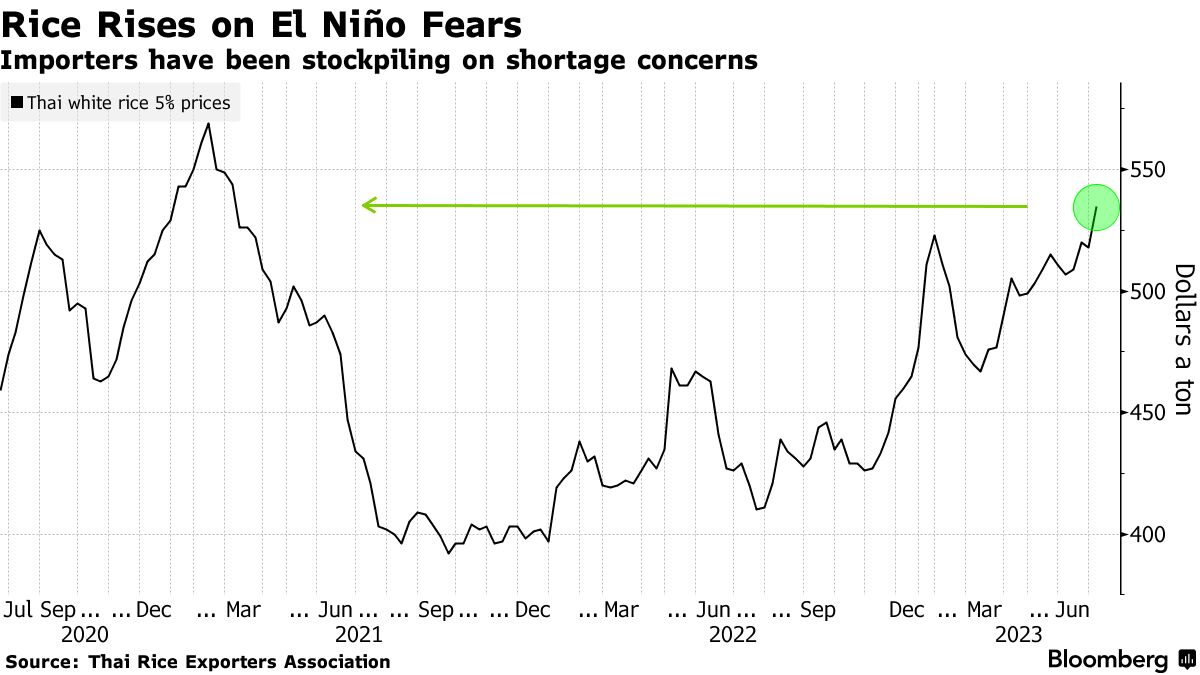
• Ag trade: Japan is seeking 123,770 MT of milling wheat in its weekly tender.
• NWS weather outlook: Additional rounds of severe weather and flash flooding persist across the Plains and Midwest over the next few days... ...Anomalously hot Summer weather forecast throughout much of the Southern Tier... ...Near average temperatures and generally tranquil conditions for the Northeast and portions of the West.
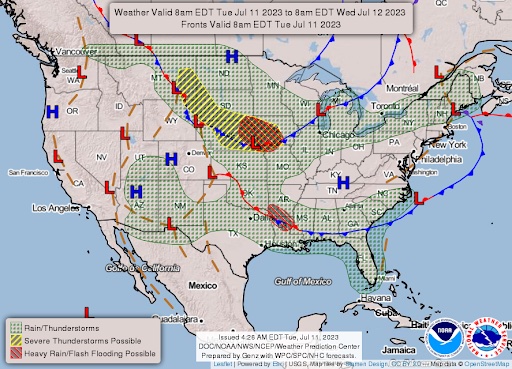
Items in Pro Farmer's First Thing Today include:
• Grains strengthen overnight
• Consultant leaves U.S. crop estimates unchanged
• Corn, soybean CCI ratings improve
• Cash cattle end three-week slide
• Hog traders signaling they sense the cash rally is nearing an end
|
RUSSIA/UKRAINE |
— Ukraine’s key allies are closing in on an agreement to start talks with Kyiv on bilateral security commitments, according to reports. Meanwhile, President Joe Biden may discuss Turkey’s request to purchase F-16s at the NATO summit in Lithuania today.
— Russia attacks Odessa port grain terminal. Russian drone attacks on the Ukrainian region of Odessa resulted in fires at two port terminals, including one grain facility. Oleg Kiper, head of the Odessa Oblast (province) Military Administration, said Ukrainian anti-aircraft defenses foiled “the enemy’s plan to attack the grain terminal.”
— Black Sea Grain pact. U.K. Prime Minister Rishi Sunak and Turkish President Tayyip Erdogan met at the NATO summit in Vilnius, Lithuania, and agreed that it was important for the Black Sea Grain Initiative to be extended, according to a statement from Sunak’s office. Erdogan has been pushing for a three-month extension of the agreement.
|
POLICY UPDATE |
— The American Carbon Alliance (ACA) has been launched in Urbandale, Iowa, with the aim of harnessing the potential of carbon capture technology to strengthen the rural communities and America's agricultural economy. The bipartisan coalition comprises influential leaders including its CEO Tom Buis, former CEO of Growth Energy and President of the National Farmers Union, as well as former Minnesota Congressman Collin Peterson, and Iowa businessman, Nick Ryan.
The ACA said it will function as an advocate for public policies that stimulate the transformation of agriculture and energy industries, enhancing national energy security. The coalition believes that the application of carbon capture technology, coupled with biofuels utilization, offers potential opportunities for rural areas and gives the country a pathway to attain energy independence. The members argue that such advancements can provide a low carbon alternative to electric vehicles, supporting reducing carbon emissions.
As part of its mission, the ACA will convene business leaders, energy producers, farmers, construction trade workers, corporations, and residents who are in favor of America's new energy future—linking modern agriculture with clean domestic energy. This new strategy is seen to encompass several domains including agriculture, energy, national security, and prosperity for communities in both rural America and around the globe. To learn more about it, visit Americancarbonalliance.org.
— The Emergency Relief Program (ERP) Phase 2 has dispersed $2.015 million among 1,065 recipients by July 9, eclipsing the $2 million threshold. However, these disbursements are significantly lower than what had been projected by the USDA for this program. The Phase 1 ERP payments remain fairly constant, adding up to a cumulative total of $7.43 billion, comprised of $6.30 billion for non-specialty crops and $1.14 billion for specialty crops.
Meanwhile, USDA reduced the payment amounts under the Coronavirus Food Assistance Program 2 (CFAP 2). Latest reported figures indicate $19.43 billion total disbursements, a slight drop from the initially reported $19.48 billion. The breakdown now consists of initial CFAP 2 payments at $14.50 billion (lowered from $14.55 billion), and top-up payments at $0.92 billion, which show a significant reduction from the previous $4.93 billion.
Note: USDA has not extended the due date for ERP Phase 2 and PARP. They are both due this Friday.
As for 2022 ERP, a USDA official told us: “It certainly helps us get to the end goal but there are other policies that are area based that need to be finalized prior to 2022 ERP going live; not to mention that we still will be required to publish a NOFA announcing 2022 provisions in the Federal Register before sign up is announced.”
— Is it time to repurpose CRP? Dr. Carl Zulauf of Ohio State University via a FarmDoc Daily item (link) writes: “A Carbon Capture CRP initially focused on grasslands may offer more potential to capture carbon than the much debated, currently unproven carbon markets for the 318 million acres of principal crops in the U.S.”
With the start of the new fiscal year on Oct. 1, there will be more land, 9.2 million acres, in the Grasslands CRP, a working lands program, than in other CRP components, he said. The so-called Continuous CRP, which helps landowners install practices such as windbreaks and filter strips on small pieces of land, would be as big as the General CRP, at about 8.2 million acres apiece.
Zulauf’s suggestion: “This transformation, plus advances in GPS (Global Positioning Systems) and farm tillage as well as strong returns to producing crops since 2007, suggest it is time to merge General CRP and Continuous CRP into a Site Specific CRP,” said Zulauf. “Similar to Continuous CRP, Site Specific CRP would emphasize identification of sites in a field with the highest benefit-cost ratio for improving environmental quality while keeping the rest of the field in farm production.”
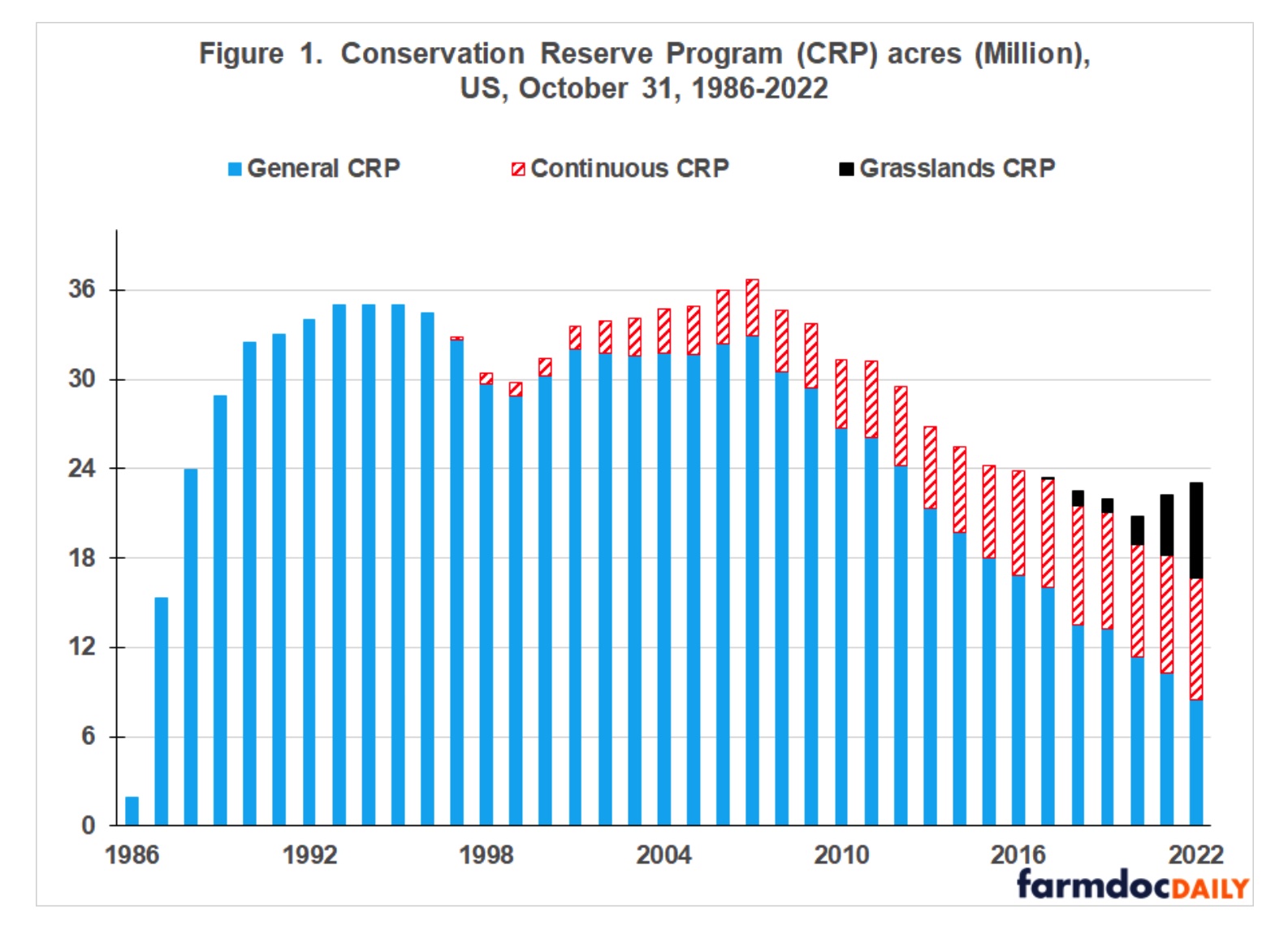
|
PERSONNEL |
— Monday evening, the U.S. Senate voted in favor of cloture concerning the nomination of Xochitl Torres Small for the position of deputy USDA secretary. The cloture vote, a procedural step to bring the nomination to a final vote, was supported 78 votes for, and only 8 against. The final vote to confirm Torres Small in her new role is anticipated to occur today. Torres Small currently is the Undersecretary for Rural Development at USDA. Prior to that, she served as a House member representing her home state of New Mexico. The position has been vacant since Jewel Bronaugh departed earlier this year,
— Biden to nominate Chollet for Pentagon post. President Joe Biden plans to nominate State Department Counselor Derek Chollet to be undersecretary for policy at the Pentagon.
— FTC nominees. President Joe Biden has put forward Virginia Solicitor General Andrew Ferguson and Utah Solicitor General Melissa Holyoak as his nominees for Republican positions on the Federal Trade Commission (FTC), currently led by Democrat Chair Lina Khan and two Democratic commissioners. Senate Minority Leader Mitch McConnell (R-Ky.) has called for swift voting on these nominations, not least due to Ferguson's past work as his chief counsel from 2019-2021. The FTC is under the spotlight under the Biden administration with increasing attention on competition dynamics in a range of sectors, including agriculture. In line with this, this week USDA is presenting a webinar to discuss its newly released report examining competition in agriculture, while the White House is planning a listening session with farm and ranch representatives to address these competition issues.
|
CHINA UPDATE |
— John Kerry, President Biden’s climate envoy, will travel to China this week to resume talks on global warming. These discussions were halted in August 2022 after Beijing withdrew following a visit to Taiwan by then House Speaker Nancy Pelosi (D-Calif.). This visit will be Kerry's third as a climate envoy, with prior ones being made by the Secretary of State and Treasury Secretary.
Both nations are the two largest investors in clean energy. Major divisions remain over the rate each should halt their dangerous fossil fuel emissions.
In terms of policy, the U.S. has committed to halving emissions by 2030, in part facilitated by the Inflation Reduction Act implemented by Congress, which committed at least $370 billion to wind, solar, and other clean energy. China has pledged to peak its carbon emissions by 2030 and stop them altogether by 2060, despite currently burning more coal than the rest of the world combined.
Rep. James Comer (R-Ky.) criticized the trip as undermining the U.S., accusing Kerry of pushing a radical Green New Deal agenda.
Kerry’s goals: He wants to encourage China to phase out coal faster, combat deforestation, and present a plan to reduce methane emissions, a potent greenhouse gas. Thus far, these issues, which were part of a joint agreement in 2021, have not been actioned by China.
— China's state-run media indicated the potential for additional policies aimed at bolstering the real estate segment, signaling a response to the intensifying stress in the country's $12 trillion onshore credit market. Chinese authorities have recently helped prop up the struggling property market, and reports hint at the possible development of supplementary support measures for the same, coupled with initiatives to stimulate business confidence. An ex-official from the People's Bank of China suggested that the country could increase borrowing to rejuvenate the economy.
Stress in China's domestic credit system rose from Level 3 to Level 4 in June, hitting its maximum mark since February, as per Bloomberg's China Credit Tracker. The mounting onshore defaults amidst concerns over the property segment have exacerbated these pressures.
Implications of governmental efforts to bolster the frail real estate industry and stimulate economic growth have been felt by investors in Chinese bank stocks. A Bloomberg Intelligence stock index of Chinese lenders has dipped 14% from its peak in May, eliminating $77 billion in market capitalization. These factors highlight that investors are often the ones to bear the cost of such rescue initiatives.
— Cut to rates spurs jump in new Chinese bank loans. China’s banks provided CNY 3.05 trillion ($420 billion) in new yuan loans in June, more than double the CNY 1.36 trillion during the previous month and well above market expectations of CNY 2.34 trillion. It was also the largest amount of new bank loans for June since at least 2004, as demand for credit increased after the People’s Bank of China (PBOC) reduced its key lending rates on June 20 for the first time since August.
— Update on China’s change to soybean inspections. On Monday we reported China’s customs agency will require importers to stage imported soybeans at specific warehouses before they get quarantine permission for the shipments to enter the domestic market. That will only pertain to imported soybeans at the Qianhai Mercantile Exchange, according to Reuters. Under the new rules, Qianhai will draw up a list of importers qualified to carry out offshore spot transactions of soybeans through the exchange and submit it to the customs authority.
|
TRADE POLICY |
— Australia's ongoing trade negotiations with the European Union (EU) have reached a deadlock due to limited market access offered by the bloc. Trade Minister of Australia, Don Farrell, who is currently in Brussels for discussions with Valdis Dombrovskis, the representative of the EU, has expressed his dissatisfaction with the proposed market access for Australian exports of beef, sheep, and sugar. Farrell has stated his readiness to abandon the trade agreement discussions if the EU does not enhance their offer.
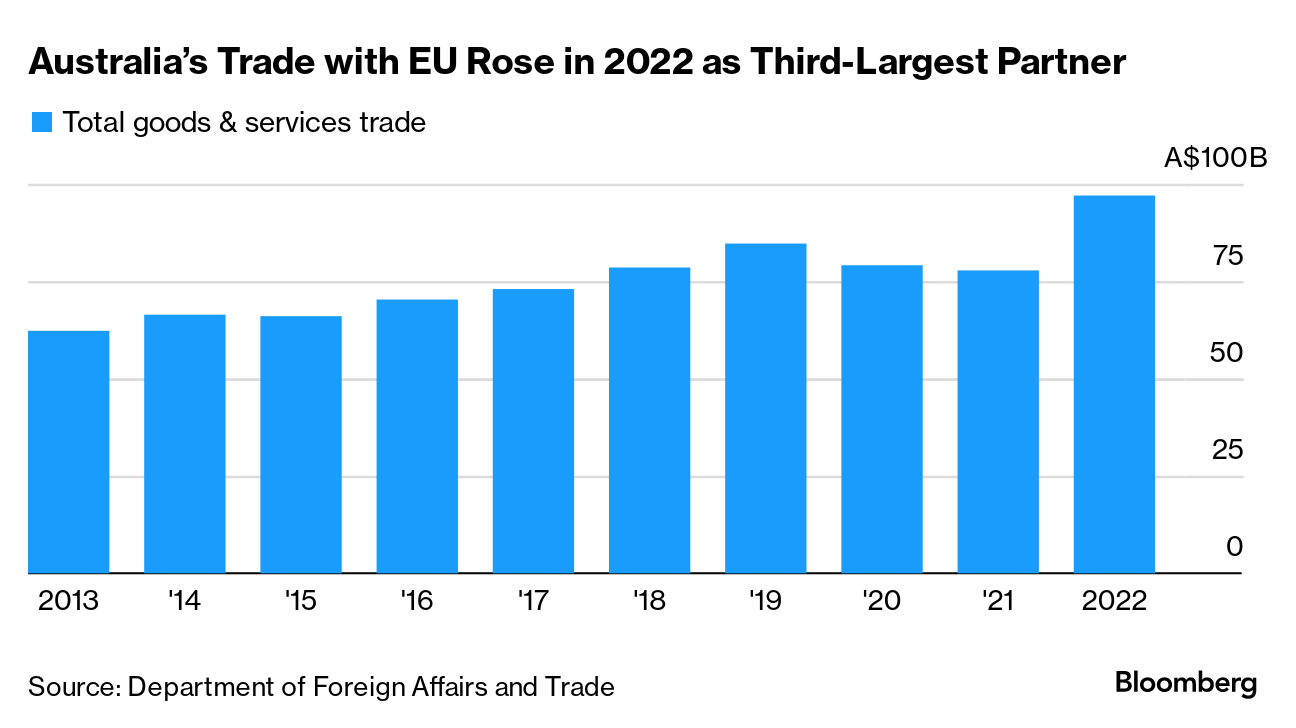
|
ENERGY & CLIMATE CHANGE |
— Court halts troubled Mountain Valley Pipeline. The Mountain Valley Pipeline project, located in Virginia's Jefferson National Forest, has been temporarily halted by the Fourth Circuit, pending review of an environmental group's petition against the Bureau of Land Management's approval of the contentious energy infrastructure project. However, it remains unclear if the court possesses the authority to halt construction, as project permits were approved by Congress and judicial review was explicitly limited in recent debt limit discussions.
Sen. Joe Manchin (D-W.Va.), a staunch supporter of the pipeline, condemned the court's verdict, asserting the Fourth Circuit no longer holds jurisdiction over the project's construction permits according to recent legislation. On the other hand, the Wilderness Society and the Southern Environmental Law Center, who oppose the pipeline, contend that the court does have jurisdiction under the Administrative Procedure Act due to alleged environmental statute violations.
Both the pipeline's developers and several federal agencies, including the Bureau of Land Management and the Forest Service, dispute this rationale, insisting that the court lacks jurisdiction due to a recent congressional endorsement (Fiscal Responsibility Act of 2023) of the project. Natalie Cox, a spokesperson for the pipeline's developer Equitrans Midstream Partners, has stated that they are closely reviewing the court's decision and will offer additional comments in the forthcoming days.
— Tax and law firms are expanding their teams to manage the burgeoning demand for clean energy, driven by corporate clients eager to take advantage of the Inflation Reduction Act (Climate Bill). This climate-and-tax law provides billions of dollars in tax credits, propelling a surge of interest in the clean energy sector. Tax professionals and lawyers are instrumental in helping companies navigate these incentives, amplifying growth in this sector. A prominent provision in the law, known for enabling clean energy developers to sell credits to any corporate firm wishing to mitigate its taxes, could significantly broaden the investment landscape in renewable energy.
However, uncertainties linger due to many profitable clean energy tax credits depending on labor requirements, which are still not regulated. Despite this, various stakeholders, such as clean energy companies, contractors, and investors, are moving forward with projects in anticipation of delayed regulations. This has sparked further investment into the transition towards clean energy, emphasizing the sector's potential.
Meanwhile, recent years have seen the emergence of a burgeoning carbon credit market. A case in point is Rebellion Energy Solutions, one of several companies that have formed in the last two years with a mission to locate an estimated 3.7 million abandoned wells, assess their methane leakages, and cap them to trap the gases underground. The ambitious objective is to convert these efforts into carbon credits, which they plan to sell to buyers who desire to voluntarily counterbalance their own emissions. This can contribute significantly to efforts to curb global climate change.
— Chinese homegrown passenger car brands, particularly those producing electric vehicles, are witnessing a rise in sales, surpassing their Western counterparts. This development not only illustrates the increasing influence of native EV manufacturers but also underscores the success of Beijing’s industrial policy. According to Monday's report from the China Passenger Car Association, local brands have dominated 54% of China's wholesale car market in the first half of 2023, a significant increase from 48% during the same period last year. This marks the second time in a row that domestic brands have outperformed foreign competitors on a semi-annual basis. Link to more via the Wall Street Journal.
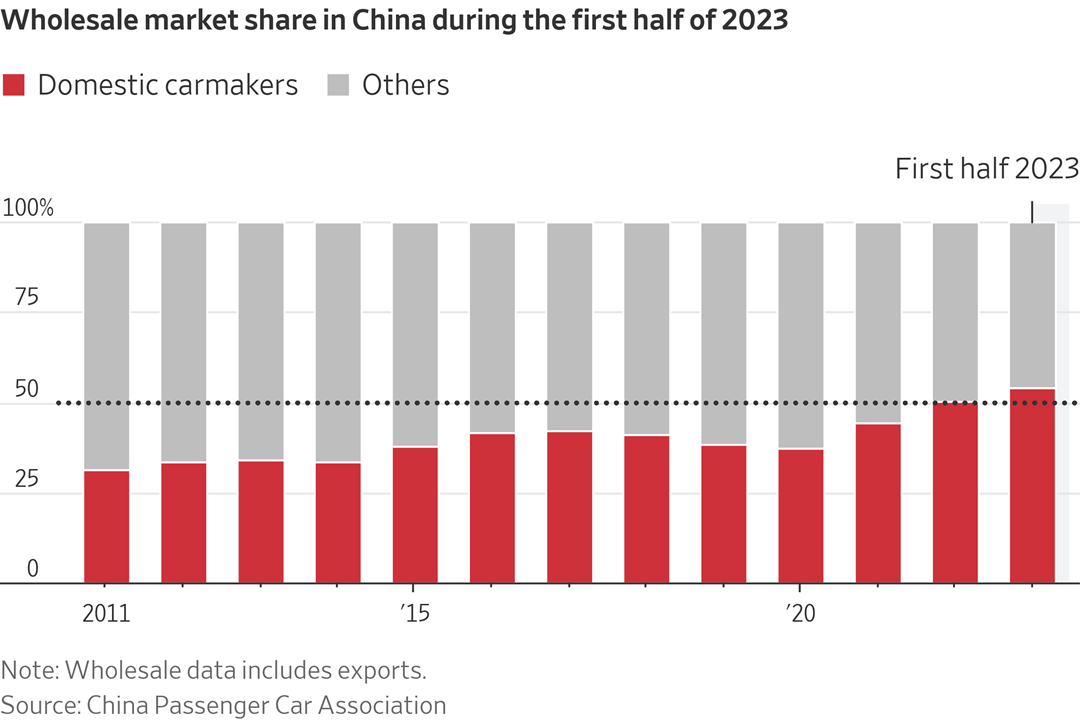
|
HEALTH UPDATE |
— U.S. regulators are allowing imports of additional supplies of a cancer drug from China amid a nationwide shortage that has forced doctors to ration care, putting patients’ lives at risk.
|
OTHER ITEMS OF NOTE |
— IARC to publish aspartame finding Friday. The International Agency for Research on Cancer (IARC) announced plans to release its assessment regarding possible carcinogenic effects of aspartame, a commonly used artificial sweetener, this Friday. Once the findings are published, the Joint FAO/WHO Expert Committee on Food Additives will proceed to update its risk assessment of aspartame. This process will encompass a revisit of the acceptable daily intake level and a revision of the dietary exposure assessment for aspartame. Although the research content is meant to be withheld until its official publication, there have been rumors circulating due to leaked reports suggesting that aspartame may be declared as a potential carcinogen in the upcoming announcement.
|
KEY LINKS |
WASDE | Crop Production | USDA weekly reports | Crop Progress | Food prices | Farm income | Export Sales weekly | ERP dashboard | California phase-out of gas-powered vehicles | RFS | IRA: Biofuels | IRA: Ag | Student loan forgiveness | Russia/Ukraine war, lessons learned | Russia/Ukraine war timeline | Election predictions: Split-ticket | Congress to-do list | SCOTUS on WOTUS | SCOTUS on Prop 12 pork | New farm bill primer | China outlook | Omnibus spending package | Gov’t payments to farmers by program | Farmer working capital | USDA ag outlook forum | Debt-limit/budget package |

